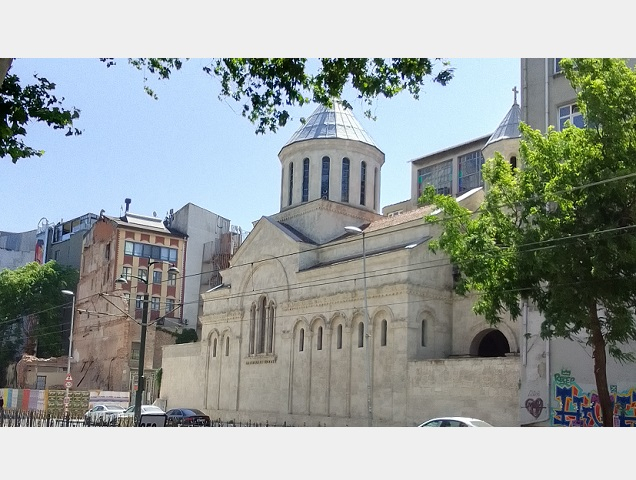Research News
Mar 28, 2025
- Literature and Human Sciences
Ottoman Empire’s religious ‘tolerance’ another form of control
Non-Muslim communities were recognized, given authority as way to monitor themselves amid Ottoman suspicions in wake of Greek revolt
Armenian church in the Galata district of Istanbul
The Ottoman Empire’s seeming tolerance of non-Muslim religions was part of a way to manage communities that drew the empire’s suspicions, according to an Osaka Metropolitan University historian.
Credit: Osaka Metropolitan University

Population surveillance. The carrying of identification while traveling. Add to that the public presence of diverse religions and it sounds like 2025, but this was life in the Ottoman Empire 200 years ago. Yet this seeming tolerance of non-Muslim faiths was in fact tied to the first two aspects, according to research by Osaka Metropolitan University Associate Professor Masayuki Ueno.
The Ottoman Empire lasted from around 1300 until 1922, and at various points in its history ruled present-day Turkey, Egypt, Greece, Hungary, and beyond. In the wake of the 1821 Greek revolt, the Ottoman Empire instituted several changes to maintain control over the population, especially in its capital of Istanbul. Internal passports were issued and surveillance was conducted not by infiltrating non-Muslim communities, including Greek populations, but by granting powers to those non-Muslim religious authorities to monitor their own people.
Behind the recognition of religions and the representation of non-Muslim religious authorities in the governing system was deep Ottoman suspicion, not a policy of tolerance, concludes Professor Ueno of the Graduate School of Literature and Human Sciences, an expert on the history of Christian Armenians in the Ottoman Empire.
“Uncovering this history helps form a bridge between what we know about the Ottoman Empire during two periods that have been studied separately, the early modern (16th to 18th centuries) and the modern (19th to early 20th centuries), in the context of a series of recent studies that have reexamined our understanding of the treatment of non-Muslims in the empire,” Professor Ueno explained. “I hope this will lead to further discussions.”
The findings were published in Comparative Studies in Society and History.
Funding
This work was supported by JSPS KAKENHI grant numbers 20KK0266 and 23K00870.
Paper information
Journal: Comparative Studies in Society and History
Title: Purifying Istanbul: The Greek Revolution, Population Surveillance, and Non-Muslim Religious Authorities in the Early Nineteenth-Century Ottoman Empire
DOI: 10.1017/S0010417524000343
Authors: Masayuki Ueno
Published: 10 January 2025
URL: https://doi.org/10.1017/S0010417524000343
Contact
Masayuki Ueno
Graduate School of Literature and Human Sciences
Email: m_ueno-lit[at]omu.ac.jp
*Please change [at] to @.
SDGs
